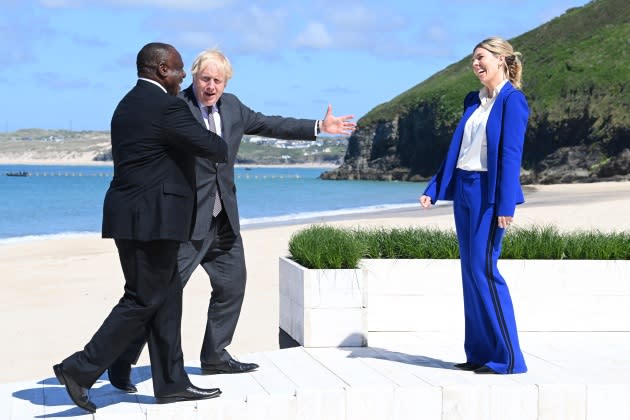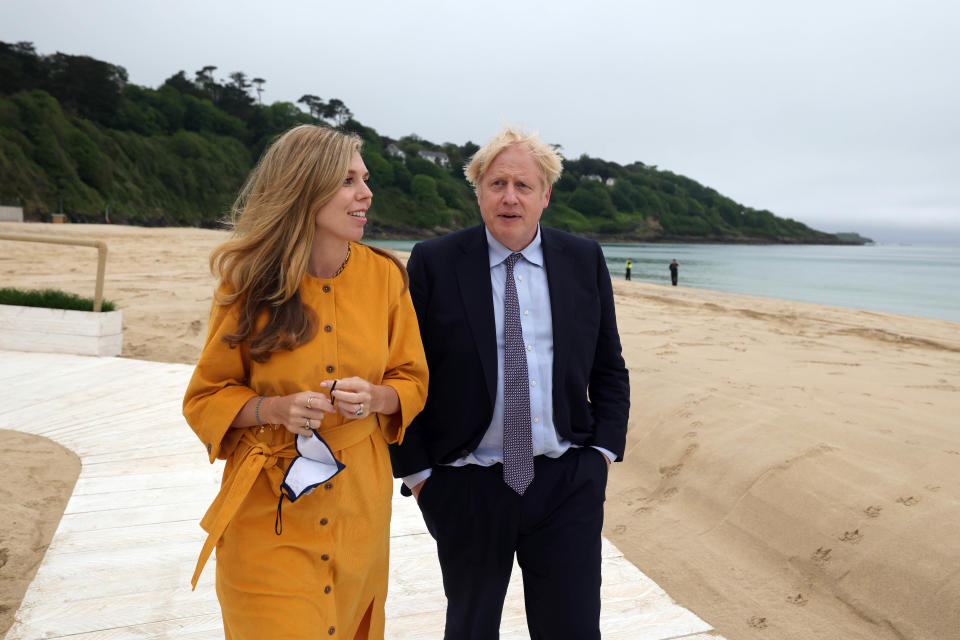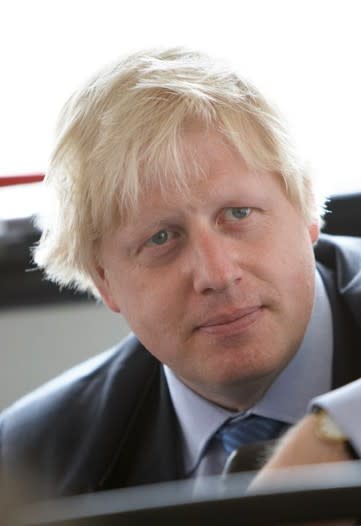U.K. Businesses Bid Farewell to Boris Johnson, Markets Make Small Gains
- Oops!Something went wrong.Please try again later.

LONDON — British business leaders hailed Boris Johnson’s abrupt resignation as prime minister on Thursday, saying his departure will put an end to the sleazy side shows and scandals that marked his tenure, and pave the way for economic growth.
“This is a reset,” said Helen Brocklebank, chief executive officer of Walpole, the association of British luxury makers, and a powerful industry lobby. “We all want the Conservative Party to be about business, and not distracted by Boris.”
More from WWD
Brocklebank said Johnson’s resignation, after more than 50 members of his government walked out in the space of 48 hours, “was a long time coming, and will allow the party to put business center stage.”
Johnson, who survived a vote of no-confidence in Parliament last month, fell on his sword early Thursday amid mounting accusations of lying, impropriety, and bringing shame on the party with his personal and professional behavior during, and after, the pandemic.
On Thursday, markets edged up on news of the resignation, with the FTSE 100 climbing 1.23 percent to 7,195.32 in early-afternoon trading, and closing up 1.14 percent at 7,189.08.
Shares in Burberry closed up 0.3 percent at 16.35 pounds, while Unilever ended the day notching a 0.5 percent gain at 38.92 pounds.
The pound made modest gains against the euro and the dollar, rising 0.4 percent to 1.18 euros, and to $1.20.
The markets are not expecting any major fiscal or taxation-related changes from Johnson over the next few months, or from his successor.
The British government’s challenges remain the same: inflation is stalking the country; gasoline prices are soaring; labor unrest is increasing with strike action planned throughout the summer, and Russia remains a threat to Europe’s security.
While Johnson may be remembered for Britain’s successful coronavirus vaccine rollout program, and its immediate and robust support for Ukraine following the Russian invasion, his tenure has been scarred by sleaze scandals and a fumbled economic agenda in the face of rising inflation and sluggish growth.
It’s not just business leaders who are breathing a sigh of relief that Johnson, who spent less than three years at No. 10 Downing Street, will be leaving his post.
Members of the public and his own government have described his scandal-prone behavior as a major distraction from the business of recovery post-COVID-19 and post-Brexit.
“What a depressing state of affairs. So much needless damage caused,” tweeted Kwasi Kwarteng, Britain’s business secretary and a member of Johnson’s cabinet. “We now need a new leader as soon as practicable. Someone who can rebuild trust, heal the country, and set out a new, consistent economic approach to help families.”
Although Johnson plans to remain in his post until a new prime minister is named in the fall, business leaders urged the current government to start making policy changes as soon as possible.
Broadly speaking, they want lower taxes, a return of the VAT rebate program for foreign tourists, and strategies to attract more international investment.
Tony Danker, director-general of the Confederation of British Industry, said Johnson “backed U.K. business throughout COVID[-19], and has been steadfast in his support for Ukraine. He will leave office with our best wishes.

Courtesy of Andrew Parsons / No10 Downing Street
“But we now need the political vacuum to be filled at speed to protect people’s living standards, through action on business confidence, investment and growth. Getting the economy growing again has got to be the number-one focus for all politicians,” he said.
Shevaun Haviland, director-general of the British Chambers of Commerce, said that Johnson’s resignation “will finally bring this chapter of political instability to an end.”
“Action is needed quickly to help business. We’re on limited time, and the government must reset, rethink and get its house in order and swiftly demonstrate that it is on the side of business if confidence is to be restored. We will continue to work with the government to ensure vital support for business remains a priority,” Haviland said.
The British Fashion Council did not respond to a request for comment about Johnson’s departure.
It was exactly one month ago that Johnson addressed BFC officials and members of the industry at a reception at No. 10 Downing Street. He pledged 80 million pounds in green funding for fashion and said the check was on the way.
It remains unclear whether it ever arrived, or will ever arrive.
As reported, the BFC plans to use the funding to set up a 10-year Fashion Industry Sustainable Change Program. The aim is to create a “world-leading, circular fashion ecosystem with innovation and creativity front and center.”
The Sustainable Change Program will include the first, industry-led Center of Excellence, which will be housed within the BFC’s Institute of Positive Fashion.
The Center of Excellence will convene industry leaders such as designers, retailers, manufacturers, academics and trade organizations including U.K. Fashion and Textiles and the British Retail Consortium.
The BFC said the program, which will cost around 80 million pounds, and aims to deliver local “ecosystems” focused on recycling, innovation and new, circular business models.
In a brief speech last month, Johnson said fashion was a big contributor to the economy and to “Brand Britain.”
“I am delighted to support this brilliant industry as it moves forward with a 10-year program bringing opportunities across the U.K. to meet our Government Climate Action Plan of environmental and societal change,” he told the Downing Street crowd, which also included his wife Carrie Johnson and their two small children, Wilf and Romy.

Courtesy Photo
Earlier on Thursday, Johnson stood in front of his home, and office, at No. 10 Downing Street and told the country that he resisted resigning for so long out of a sense of duty.
He was unrepentant about his tenure in office and made clear that he did not want to step down.
“I felt it was my job, my duty, my obligation to you, to deliver my mandate in person,” he told the British public. “I’m immensely proud of the achievements of this government in getting Brexit done [and] reclaiming the power for this country to make its own laws in Parliament.
“Getting this country through the pandemic, getting the fastest vaccine rollout in Europe, the fastest exit from lockdown, and in the last few months leading the West in standing up to Putin’s aggression in Ukraine,” he said in listing what he considered his accomplishments.
Johnson added that it was clearly “the will of the Parliamentary Conservative Party that there should be a new leader of that party and so a new prime minister. The process of choosing that new leader should begin now.”
Sign up for WWD's Newsletter. For the latest news, follow us on Twitter, Facebook, and Instagram.

